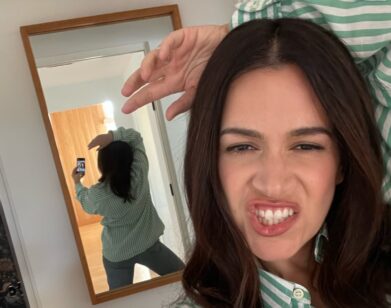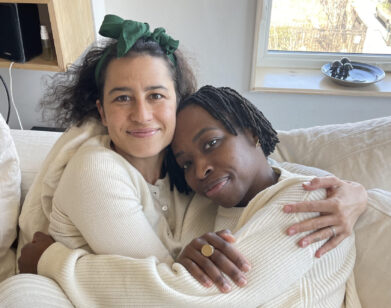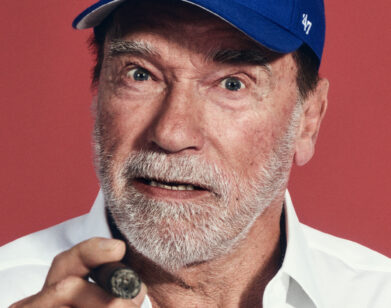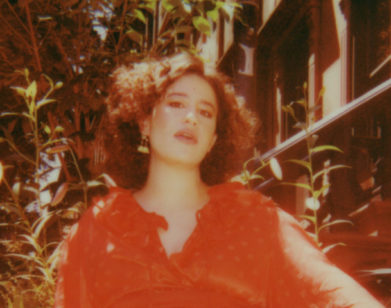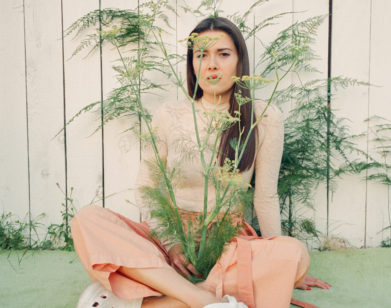in conversation
Rob McElhenney and Ilana Glazer on How to Stay Sane in Show Business
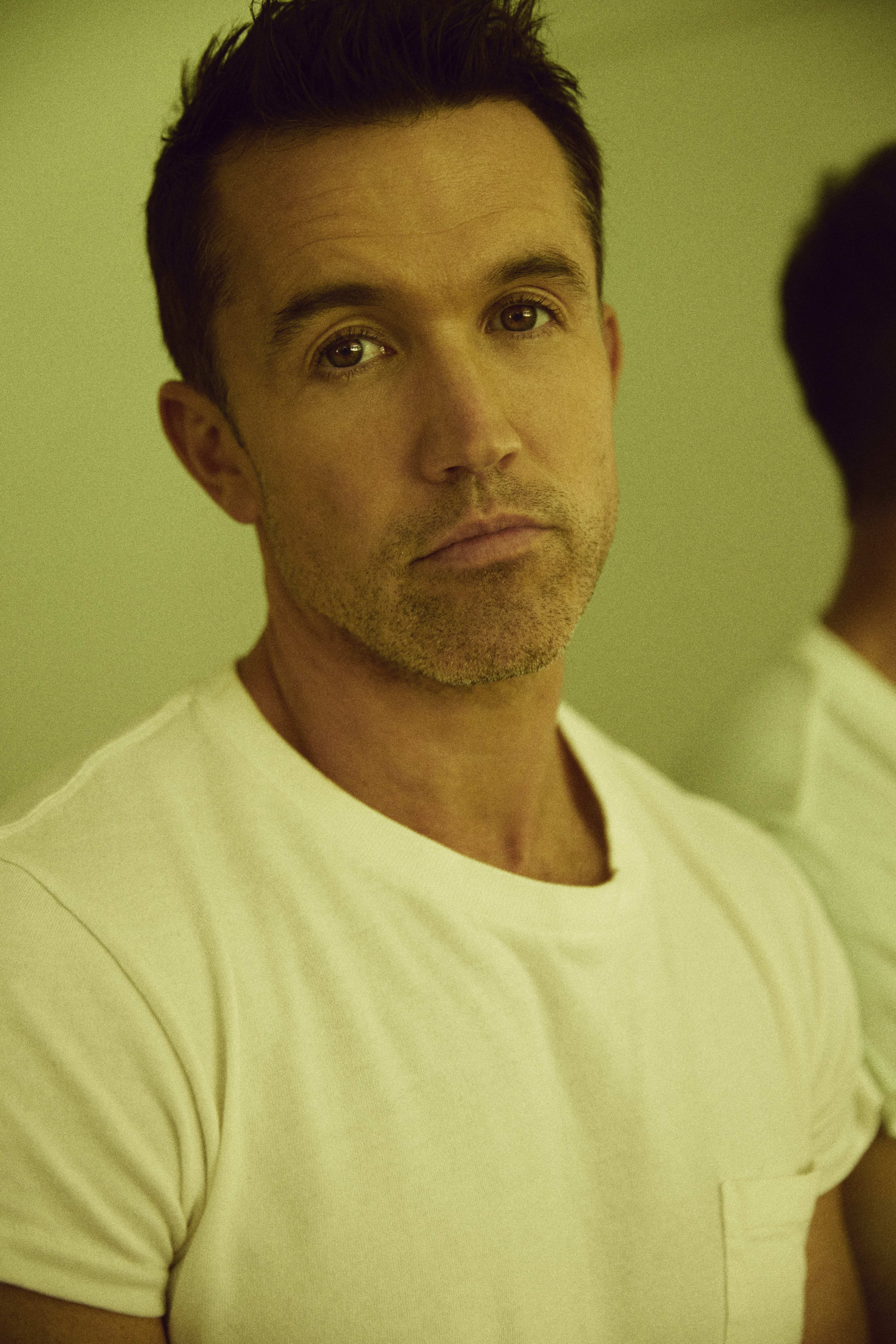
How would the degenerates of It’s Always Sunny in Philadelphia deal with a global pandemic? Who becomes the crazy anti-vaxxer? How long would it take for the gang to break quarantine? Fans will find out later this year when the show’s 15th season, now in production, airs on FX after a two-year hiatus, making it the longest-running live-action comedic sitcom in TV history. (Future contenders will have an even higher bar to clear—Sunny’s been renewed through season 18.) Rob McElhenney, who co-created and stars in the series, promises it will be the same show we all remember, which is to say that nobody learns a thing, and the gang remains as hilariously despicable as ever.
At the same time, McElhenney is older and wiser now, and eager to correct some of the things the show got wrong during his salad days with the help of a younger and more diverse writers’ room. The world got a glimpse of McElhenney’s take on current events when he appeared on the cover of Men’s Health in April, and spoke with Ryan Reynolds about other men’s fascination with his body (he purposely gained 52 pounds on Sunny, just to make a point, and afterwards, got jacked again). And as if one sitcom wasn’t enough, McElhenney can also be seen on another show he co-created and stars in, Apple TV’s Mythic Quest, a workplace comedy set in the world of video game designers. Ahead of Sunny’s much-anticipated new season—and the ongoing second season of Mythic Quest—McElhenney spoke with Ilana Glazer about masculinity, raising a child with his costar and wife Kaitlin Olson, and smoking a J with Snoop Dogg.
———
ILANA GLAZER: I want to ask about Mythic Quest. You’re focused on authentic representation of a video game development workplace, and of the different kinds of weirdos who work there. How did the show come about?
ROB McELHENNEY: I was approached by a video game company called Ubisoft, and they were big fans of Sunny. They asked if I wanted to make a show in that world, and I said no. I had zero interest, because I’m not a big gamer. Then they said, “Would you come visit our studio and talk to people?” I thought, “Sure, free trip to Montreal.” I went up there and within 30 minutes I knew we had a really great world for a TV show.
GLAZER: So cool.
McELHENNEY: One thing that was so striking, which we represented in the show, is that there was a point when this environment was full of dudes. There was a concerted effort 10 or 15 years ago to bring in more women, but they were brought in at entry-level positions, so when you look around, you see a lot of old dudes and young women. I thought that was a cool dynamic for a TV show. Because you’re watching as the young guard comes in and says, “Hey, we’d also love to play and create video games. This isn’t just for you.”
GLAZER: How do you approach the relationship between comedy and emotion in your TV narratives?
McELHENNEY: With Sunny, the audience recognizes that the characters are all basically id incarnate, which allows us to tell these potentially divisive stories through the odd cultural lens of these sociopathic cartoon-like characters. The characters in Sunny never grow or learn, and that’s part of the joke. Mythic Quest is about creating a world where the characters feel like real people. We want to see an opportunity for growth and progression, and to do that there’s got to be a lot more pathos.
GLAZER: It’s so fucking crazy that you just locked in the 15th through 18th seasons. This makes you the longest-running TV sitcom ever.
McELHENNEY: Thank you. We eclipsed The Adventures of Ozzie and Harriet, which was a big family sitcom in the ’50s and ’60s, and I really like the idea that Sunny is the opposite of what that show was.
GLAZER: But it’s also like the Ozzie and Harriet of today, in that it’s much more aware of the horrors of this world. How does it feel to pivot back to these sociopathic cartoon characters when your focus lately has been authenticity?
McELHENNEY: There’s a freedom that comes with writing Sunny. Now, we have writers on our team whose parents wouldn’t let them watch the show when it first aired.
GLAZER: Holy shit.
McELHENNEY: That’s horrifically depressing but also exciting to me, because when we started the show, I was 25 years old or something. I was a moron. As we continued to grow, we realized we just didn’t have the intellect or expertise to actually engage with certain topics the way we wanted to. At best, it’s because we were not educating ourselves, and at worst, we were just straight-up ignorant to some of the realities we were expressing in the show. So now, we’ve been able to retroactively go back and ameliorate some of those things. We try to do it deftly because we want to stay loyal to what Sunny is. The characters haven’t learned anything, but the people who make the show have, and I hope you can tell that when you watch it.
GLAZER: I love that distinction. It’s important to keep feeding your projects with young and emerging voices, especially as you’ve become a more established TV creator and producer. You’re better equipped now to sort of father these voices.
McELHENNEY: That’s a lesson I learned from Danny DeVito within the first day of working with him. I didn’t know him very well, and he was this comedic icon. I remember giving him a direction, and then saying, “But you can say whatever you want.” He responded, “No, tell me how you want me to say it. You’re young, you know what’s funny, and I’m an old man who wants to keep growing.” At the time it was incredibly empowering. Now I’ve become an older person, I recognize that I can continue to learn from a younger generation, and also foster a lot of emerging voices. I find that really gratifying.
GLAZER: Do you have a spiritual practice? Are you into therapy? I also want to ask you about Men’s Health and your external exercising because it is so fucking funny. The transformations you’ve gone through physically, it’s hysterical, it’s like comedy Christian Bale shit. But before that: internal exercise, emotional exercise, what do you do?
McELHENNEY: I meditate and practice TM [transcendental meditation]. That’s been invaluable to me, and if you want to talk about exercise, I did find over the last few years—and I’m not trying to bro out or push some exercise agenda—but actual physical exercise has transformed not only my body, but my spirit. Not to sound too woo-woo, but exorcising the demons through actual sweat alleviates so much anxiety and stress. And I truly feel better. But yeah, the closest thing I have to a spiritual practice would be TM.
GLAZER: So we’re talking twice a day? Twenty minutes?
McELHENNEY: Well, here’s where the asterisk comes in. I definitely do it once a day, but people say, “That’s not really TM,” because the T in practice is—
GLAZER: I don’t give a shit. Daily practice is huge.
McELHENNEY: I can notice a massive difference in my mental and physical well-being when I have a daily practice. My life is infinitely better when I stick to a daily practice of TM.
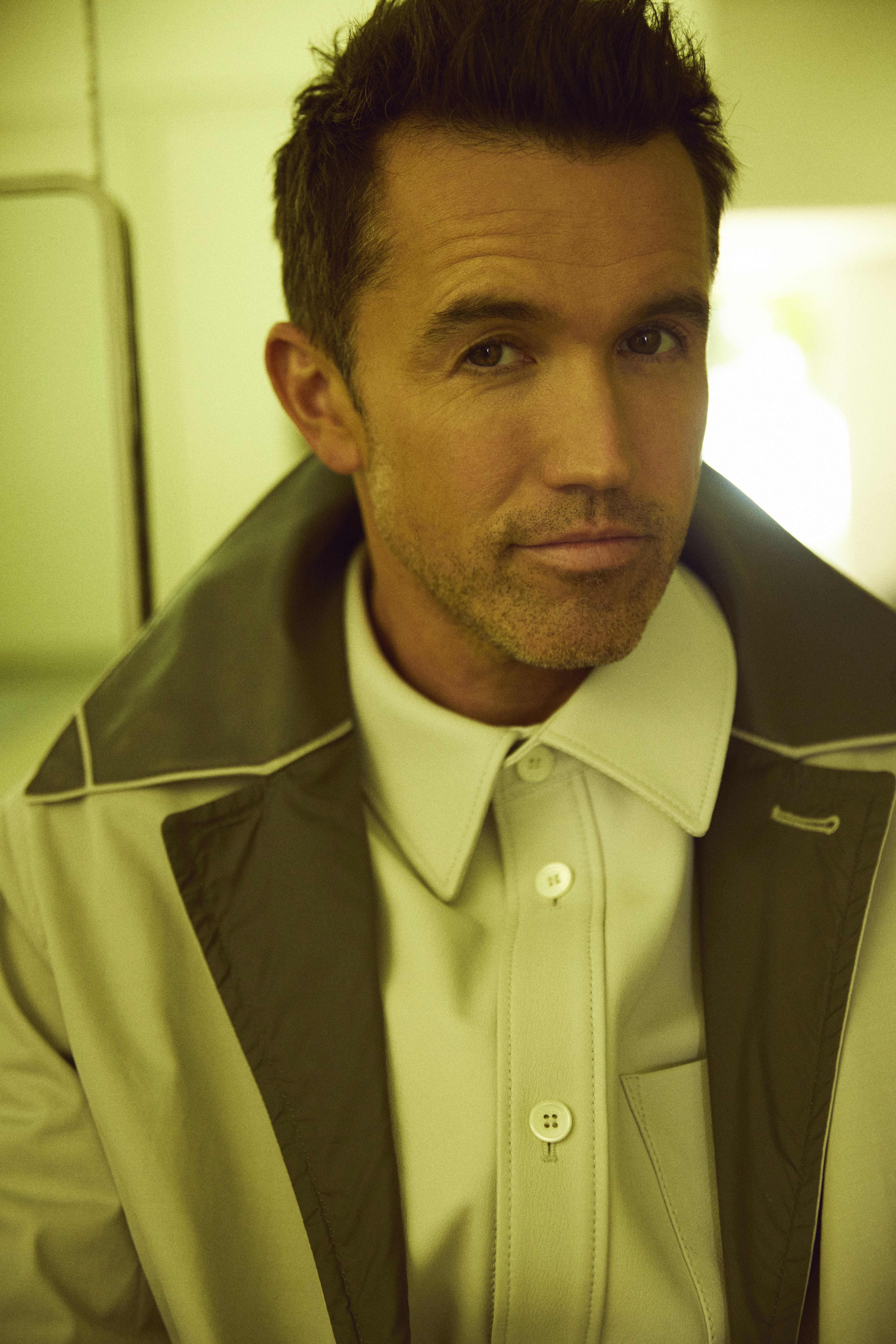
GLAZER: The Mythic Quest quarantine episode was so touching and sweet, and the recent “Everlight” episode as well. How did it come to you? And did you think it was going to resonate with audiences the way that it did?
McELHENNEY: Well, it was born out of the same things that I think Broad City was born out of. What I love so much about your show is seeing the two of you, and I know that’s not you, but it also is. They’re extreme versions of yourselves, but I’m seeing into the soul of the two women that make that show. I would say Mythic Quest is the same thing. So when we were in the middle of the pandemic, what was happening for our characters was also happening for our actors. We put those experiences into the episode and it wound up becoming really emotionally powerful.
GLAZER: I hear that you have three Oscar winners and a cameo from Snoop Dogg in the new season.
McELHENNEY: Yes. I can tell you this because I know how much of a fan you are of marijuana—I’m sorry, I know you’re not partaking.
GLAZER: It’s so sad and hard. I keep being like, “I’m almost there.” And then I’m like, “Breastfeeding? I can’t be breastfeeding and blazing.”
McELHENNEY: Kaitlin [Olson, McElhenney’s wife] eventually just said, “I’m having a glass of wine, and everyone’s just going to have to deal with it.” I don’t know if that works with marijuana.
GLAZER: Yeah, there are such things as cannabis doulas, who I will employ when the time is right.
McELHENNEY: I don’t really smoke, even though I have actively tried for so many years. My body doesn’t react to it well. However, if you have Snoop on your show, and he says, “Do you want to come smoke with me in my bus?” you say yes. I left in the middle of the day to go out to his bus, and we smoked a joint that he rolled for me. It was during COVID, which means we couldn’t share it, so I smoked almost the whole thing.
GLAZER: Amazing. You and Kaitlin are so fucking cool and funny. You’re both creatives and comedians—how do you replenish your creative reservoirs, individually and within the context of your partnership?
McELHENNEY: Well, I don’t want to be the boring person who talks about their kids, because people just skip over this part. But navigating the day with my child is so incredibly humbling, and has centered me in a way that nothing else has. It’s a perfect distillation of what can be so terrifying and also liberating as a human, which is that nothing matters. Sometimes I’m terrified by that, but sometimes I’m liberated, because I can just focus on the moment. That’s something that Kaitlin and I get to share together. It’s physically exhausting and sometimes emotionally exhausting, and yet, because it’s so rewarding, it fills our bucket and gets us excited about getting back to work.
GLAZER: At what point in your careers did you guys get pregnant?
McELHENNEY: It was in the middle of season five or six, and we had been married for two years. We had to write it into the season.
GLAZER: That’s really brave, to do it then.
McELHENNEY: It’s certainly much braver for her. At least traditionally, it’s been a lot more difficult for women to have babies and come back. It’s great that fathers are now able to take more time off from work and bear more of the load. But I will say that it was really hard for us to get pregnant. We tried for a very long time to get pregnant between seasons, and it just didn’t work. We thought it was never going to happen. And then it happened.
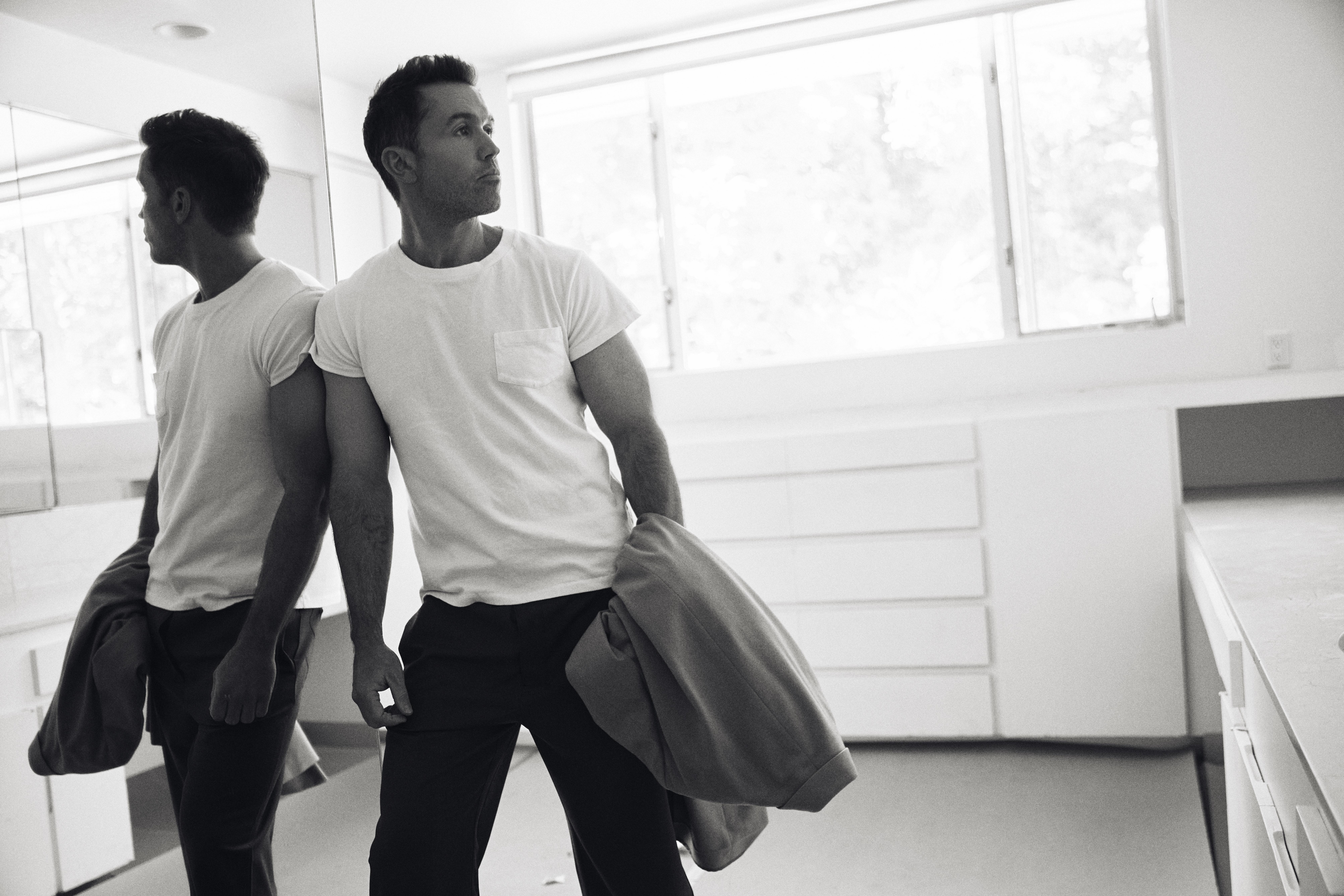
GLAZER: The way you’re talking about pregnancy and your emotional journey, and your recent conversation in Men’s Health about body dysmorphia makes me wonder if you’ve stepped into this role of being a more vulnerable public figure. Do you think it’s important to talk about this stuff?
McELHENNEY: My shows have always felt like the most appropriate platform for me to express myself. I very rarely espouse any personal opinions on social media, other than comedic type stuff. In those contexts, your words can be misinterpreted, and its difficult to express what you’re trying to say. A long-form conversation like this makes me much more comfortable. I do think there is a conversation to be had about masculinity today that is often avoided because people feel threatened and attacked. I find that there’s a subset of people who watch my shows who really respond to that theme, which is more gratifying for me than just coming straight out and sharing some opinion.
GLAZER: I’m realizing now that so much of what you do it is centered around masculinity. That is what you represent. Years ago, Broad City—the web series, before it was a TV show—was called sneak-attack feminism. And I feel like the change you create is sneak-attack healthier masculinity.
McELHENNEY: It’s something we’re working on. And that’s the beauty of a writers’ room. It’s such an incredible experience to walk into a room full of people of all ages, races, cultural backgrounds, even levels of comedy versus drama, who all have a story to tell. I get to learn from them and they get to learn from me. And more than anything else, it’s just fun.
GLAZER: Speaking of masculinity: You just bought a football team in Wales with Ryan Reynolds. Tell me about that.
McELHENNEY: Well, to be blunt, Kaitlin and I are always trying to figure out new ways to use the money that we’ve made for socially responsible purposes. The idea of owning a sports franchise was so mind-blowing to me when I was a kid—and it just seemed like it would be fun. Over the pandemic, I was watching a series of documentaries about football teams and their relationship to their local towns. A lot of these lower-league clubs were going bankrupt because of the pandemic, and the clubs are doing well, the towns seem to do well: there’s a sense of hope, and an infusion of capital. Philly is like that, too. Kaitlin and I went to the Super Bowl the year the Eagles won, and I’m not exaggerating when I say that it was one of the five greatest moments of my life. It’s about the catharsis and connection you feel with 2 million people you grew up with, who have this connection and love for this thing. I was crying next to my wife, who was crying next to a stranger, who was crying next to a 12-year-old who was also crying. During the parade the next day, I passed by this cemetery that was full of people putting flowers and Eagles flags on people’s graves. I realized people were reliving and recounting experiences they’d had with people that they loved and lost. That was so beautiful to me, and I wondered if we could figure out a way to become a bigger part of that. I decided to figure out a way to help create that feeling for this Welsh coal-mining town. Maybe we can give them a sense of that same thing that I felt with my fellow Philadelphians that year the Eagles won the Super Bowl.
GLAZER: That’s fucking dope. You are so lovely. It’s so nice to spend more time with you.
McELHENNEY: Well, you know how I feel about you because I’m always texting you and Abbi [Jacobson]. Literally every time I go to New York, I walk the Brooklyn Bridge, and every time, I look for that “Abbi + Ilana Forever” [tag from the Broad City finale], because the show’s special to me. I’m sure you find this as often as I do, which is you have those shows that just mean something to you. That make me feel inspired and less alone and optimistic about the future.

